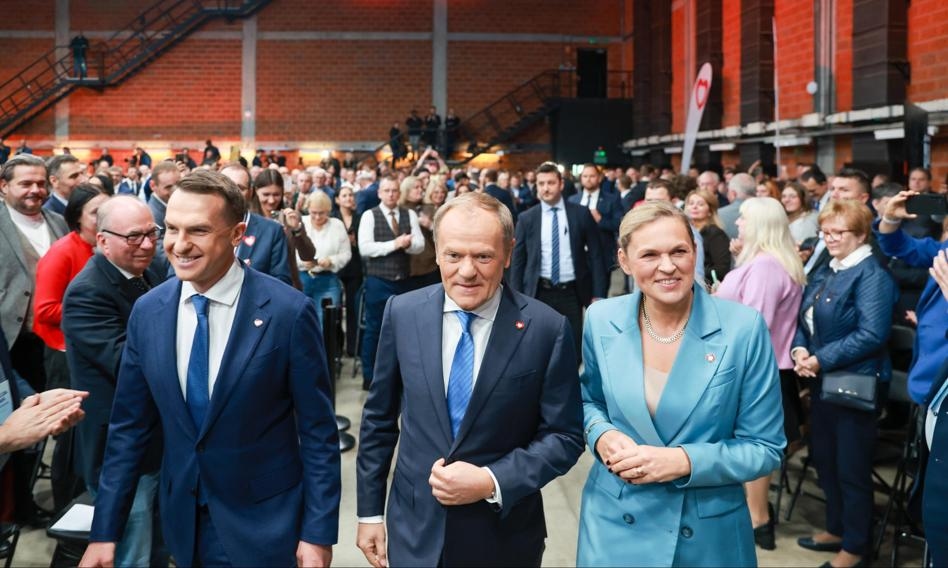People sometimes don't even know that they are acting on behalf of the Russians.

People often cooperate with Russia unaware that they are being recruited, Bartosz Cichocki, former Polish ambassador to Kyiv, told PAP. In recent months, the Internal Security Agency (ABW) has detained 55 people in Poland suspected of collaborating with Russian services, said Jacek Dobrzyński, spokesman for the special services coordinator.
Donald Tusk announced on Tuesday the arrest of eight people suspected of preparing acts of sabotage. "The Internal Security Agency, in cooperation with other services, has detained eight people in various parts of the country in recent days, suspected of preparing acts of sabotage. The case is developing. Further operational activities are ongoing," the Prime Minister wrote on the X platform at the time.
People in the service of subversionThe detainees were mostly foreigners from beyond the eastern border. Their activities included conducting intelligence and preparing acts of sabotage and diversion within the country. The primary target of these sabotage operations was critical infrastructure, including railway routes crucial for arms and humanitarian aid shipments to Ukraine.
As Bartosz Cichocki, former Polish ambassador to Kyiv, explained, by recruiting people to cooperate, Russia is simply taking advantage of the opportunities that open up before it.
"We have very serious tensions in the Western world, a conflict between anti-establishment and systemic forces. This is accompanied by a decline in trust in traditional politics and the mass media. Russia, and not only it, is benefiting from this social and intellectual confusion, targeting lost, rebellious, or desperate people online," the source explained to PAP.
Cichocki added that he remembers cases in Ukraine where people cooperated without realizing that the Russians were on the other side. "The motivations varied greatly: someone didn't have enough to survive until the next morning or was in debt, someone else was afraid of revealing compromising information, someone else had a conflict with a Polish, Ukrainian, or Georgian neighbor, or had been dumped by a girlfriend and, driven by emotion, wanted to get even," Cichocki explained. Russia managed to recruit such individuals to cooperate without even paying them, he added.
The ambassador pointed out that in Ukraine there were cases where people, for literally the equivalent of a dozen or several dozen zlotys, undertook tasks such as photographing a military transport, distributing leaflets, setting fire to a recruitment headquarters or marking the geolocation of an energy installation.
The PAP interlocutor assessed that first in Georgia and then in Ukraine the Russians had a training ground, which they are now using in Poland and will use in other countries.
This is how Russia sows confusionIn his opinion, Russia wants to sow confusion, doubt the resilience of our countries, reinforce the belief in the incompetence of the services, and sometimes, as in 2014 in Vrbetice, Czech Republic, where an ammunition depot was blown up, reduce the defense capabilities of countries it considers adversaries.
As Bartosz Cichocki pointed out, Russia is trying to show us that we must pay a price for supporting Ukraine.
The scale is larger than we think"I believe we should learn from the Ukrainians how to reverse this. How to sow uncertainty and doubt in the Russians' government. Of course, within the framework of international law. Valery Zaluzhny, Ukraine's ambassador to the UK and former commander-in-chief of the Ukrainian armed forces, writes about this in an article published by the Eastern Flank Institute," the ambassador emphasized, adding that the Ukrainian general states, among other things, that we are waging war at the hands of an attacked neighbor. Without our intelligence data, guidance systems, and unmanned technology, this war would have been completely different.
As another PAP interlocutor, Prof. Tomasz Safjański, deputy director of the Cross-border Security Research Center at the WSB University, argued, the scale of Russian-inspired sabotage activities in Europe is greater than media reports suggest.
"The pilot research I conducted at the Fire Service Academy in Warsaw, under the supervision of Professor Bernard Wiśniewski, shows that after 2022, there have been 48 cases of arson linked to the Russian Federation in Europe. Twelve of them were in Poland, the same number in the United Kingdom, 11 in Germany, and two each in Lithuania, Latvia, and Estonia," Professor Safjański said, emphasizing that he was only talking about acts of sabotage involving starting fires.
As the expert pointed out, such an effect can be achieved not only by using explosives – in some cases, cutting certain installations was enough to cause a fire.
PAP asked Professor Safjański what to do and what not to do in light of the growing threat of sabotage. He believes that, above all, we must not succumb to disinformation. If we are concerned about something, we must confront our doubts with official sources of information, preferably public ones.
The expert pointed out that sabotage threats related to Russia's actions are ambiguous in nature, meaning they can materialize at any time and in any place. Therefore, he emphasized, we must be vigilant and alert to unusual situations. For example, we should refrain from acting helpfully if a random person asks us to move a load or store a package.
The PAP interlocutor emphasized that, if necessary, the police should be notified, not other services. "They will know where to forward the information," Professor Safjański argued.
These are the methods Moscow usesSabotage activities commissioned by Moscow in Poland have taken various forms. For example, in August 2023, two Russians were detained after distributing several thousand leaflets in Krakow and Warsaw encouraging people to sign contracts with the Wagner Group (a private military company founded by Yevgeny Prigozhin, which carries out military operations and influence operations in various parts of the world on behalf of the Kremlin – PAP).
At the end of July of last year, Russian activist Igor R. was detained in Katowice, allegedly organizing the transfer of a package of explosives from the Czech capital to Ukraine. His wife, Iryna R., was also charged with espionage.
On October 16, the Internal Security Agency, in cooperation with Romanian intelligence services (SRI), detained Danylo H., a 21-year-old Ukrainian citizen who, at the request of Russian intelligence services, organized a group smuggling explosives through Poland and Romania into Ukraine. Simultaneously, two other Ukrainian citizens collaborating with the suspect were detained in Romania.
In May of last year, a fire destroyed the Marywilska 44 Shopping Center in Warsaw. A month earlier, also in Warsaw, the OBI DIY hypermarket at Radzymińska 166 was set on fire. A similar incident also occurred in Vilnius, where an IKEA store caught fire in May 2024.
The Internal Security Agency and the National Prosecutor's Office determined that the series of fires was the result of sabotage ordered by Russian intelligence, and the entire operation was coordinated remotely by a person located in Russia.
During the investigation, Ukrainian citizens Daniil B. and Oleksandr H., among others, were detained and charged for constructing and remotely using the detonators. It was determined that Oleksandr V., who was overseeing the operation from Russian territory, ordered the filming of the Marywilskaya fire and its subsequent publication on propaganda websites.
In March 2023, the Internal Security Agency (ABW) dismantled the largest sabotage network operating for Russian military intelligence (GRU) in Poland. Sixteen foreigners were detained. The group included citizens of Ukraine, Belarus (two students), and a Russian (a hockey player playing for the Silesian team).
It was determined that the group had been operating near key logistics hubs (including Przemyśl and Rzeszów) since at least January 2023. Its members were said to have conducted reconnaissance of critical infrastructure, monitored military transports, and planned to derail trains carrying aid to Ukraine. They received orders from Moscow remotely and were paid in cryptocurrencies.
Polish authorities deemed the risk of attacks too great to continue surveillance of the group and decided to immediately detain its members. All the accused pleaded guilty. Some of them applied for asylum in Poland, attempting to avoid deportation to their countries of origin. (PAP)
Dec/ bst/ mhr/
bankier.pl





